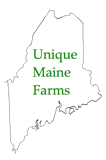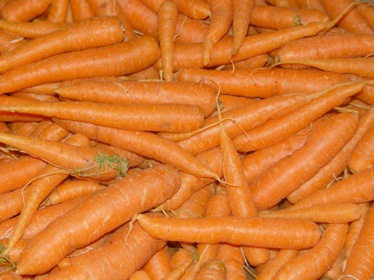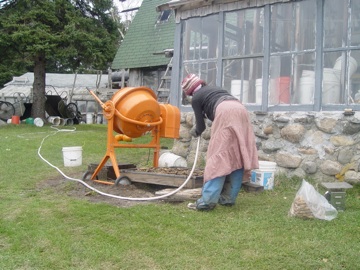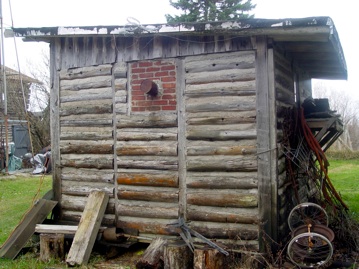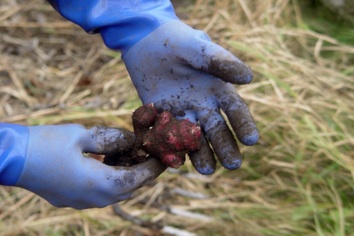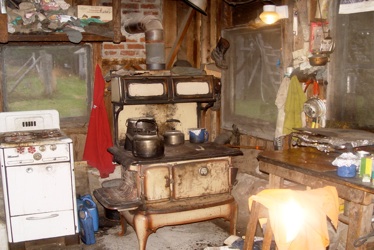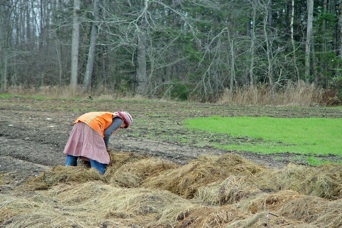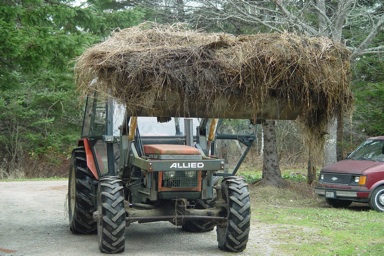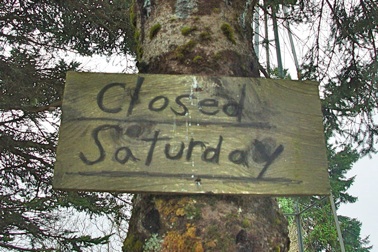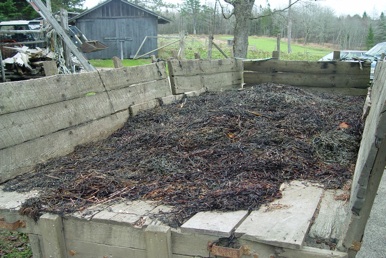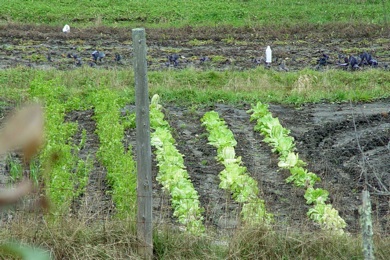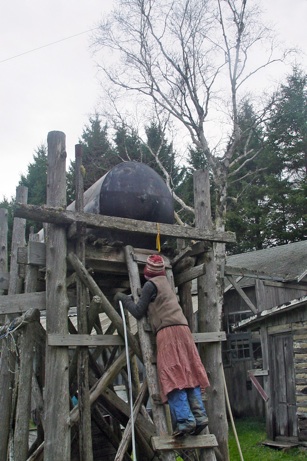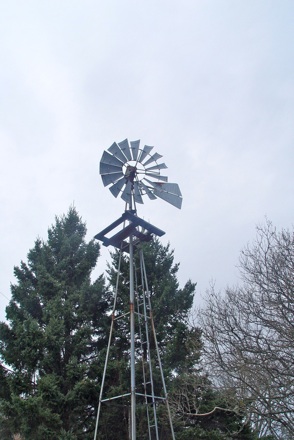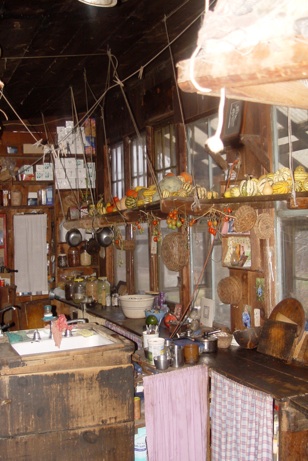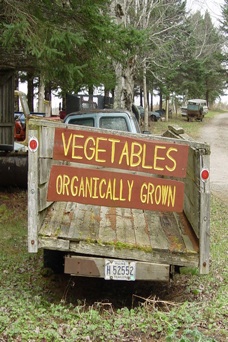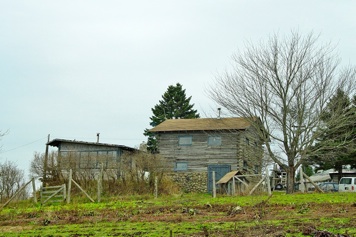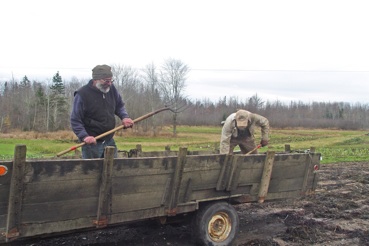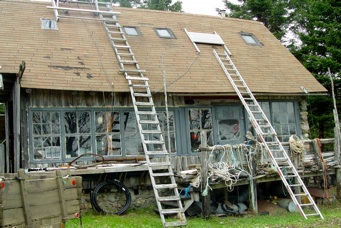Name: Crossroad Farm
Address: Avraham Pearlman
Dinah Bracha Pearlman
314 Cross Road
Jonesport, Maine 04649
Phone: 207-497-2641
Products and Services:
-organic vegetables and herbs
-wholesale accounts
What Makes Crossroad Farm Unique?
Every farmer has a relationship that ties them to their land. The connection that Avraham and Dinah Bracha Pearlman of Crossroad Farm in Jonesport have with their farmland and the crops that they grow seems to be such a powerful factor of who they are and how they live. This connection ties in with their Jewish faith which has a long history of appreciation and deep respect for those who farm the land and grow food for others.
After talking with Avraham and Dinah Bracha and learning about their way of living, it is obvious that their land has provided them with their food and physical nourishment since their first gardens began producing. There is a distinct feeling that their land is also linked with a spiritual essence that is a real motivating factor in the lifestyle choices that they have made over the past forty-four years.
While many young people flocked to rural areas in the 1970's and vowed to live off the land, like Avraham and Dinah Bracha, it would be interesting to observe how many of those original homesteaders have actually still remained committed to a totally self-sufficient way of living as the Pearlmans have.
When they purchased their twenty acres in Jonesport in 1969 for $800, Avraham and Dinah Bracha were faced with the challenge of clearing the many trees and building a home with only the use of hand tools. They had both hailed from city backgrounds and had no experience with subsistence farming. They relied on The Homebuilt House book for tips about constructing their home and met one challenge after another with an unparalleled determination.
Their first year involved living part of the time in an old van. Right from the start, they were committed to growing their own food and enthusiastic in supporting organic farming practices. They read books by Rodale and visited with Scott Nearing. They have never deviated from the belief in organic methods and have been associated with Maine Organic Farmers and Growers Association since the organization's beginning days.
By choice, Avraham and Dinah Bracha have lived for over forty years without electricity. There is not an indoor plumbing system so toilets, showers, and running water have not been part of their living arrangement. Most individuals living in Maine take these basic domestic systems for granted. When power outages occur, it often becomes a major issue for many Mainers. During the ice storms that Maine often experiences, there is so often a rush to the store to stock up on food items. This pre-storm scenario is often accompanied with apprehension about the loss of the major conveniences and the interruption of the usual reliance on one's means for cooking, refrigeration, and access to water, computers, television, and countless devices.
The Pearlmans would probably have a difficult time understanding and identifying with this common pre-winter storm mania phenomenon. Dinah Bracha explained that the lack of electricity on their farm has not caused major challenges for their lives. She and Avraham have long been vegetarians who have chosen also to not eat eggs or to drink milk. They enjoy a kosher diet. There are none of the worries of meat or food spoiling that usually accompany a power outage situation because the Pearlmans have never even had a refrigerator! They keep their vegetables cool in three large well-stocked stone root cellars that they dug in the ground by hand.
Burning wood in their wood stoves provides heat for their home and is the source for their baking and cooking throughout the year. Their light comes from propane lamps. They erected a windmill to generate electricity that could be stored in batteries. Their well was hand dug after choosing a location suggested by a dowser.
Can you imagine successfully operating a large wholesale vegetable farm without electricity as the Pearlmans have done for the past forty-four years? The amount of physical work that they have accomplished is mind-boggling. The land that they purchased contained very poor soil with an abundance of sand and rocks. They have dedicated many years to building the soil with layers of seaweed and fish waste. They grow over five hundred varieties of organic vegetables and have established large fields of strawberries, garlic, and asparagus. They have earned a reputation for their large selection of organic potatoes. There are over three hundred apple trees in their orchard with over thirty different kinds of apples. Everywhere one looks are fields with extremely long rows of various vegetables and herbs. Dinah Bracha commented that Avraham refuses to cut back on their farm operation and is always considering additional crops to grow. They have developed a base of wholesale customers for their vegetables that include several restaurants and stores.
Various barns, sheds, outbuildings, and even a sauna from the wood that they have harvested from their land have been built by the Pearlmans on their property. A windmill that Avraham constructed is used to pump water. The Pearlmans could be classified as "recyclers extraordinaire." All types of materials have been saved to be re-purposed. There are several cars on the property from which Avraham takes parts to use for projects on the farm or which he combines to create a working vehicle. There are piles of cardboard boxes and wooden containers that have many uses for harvesting and deliveries. Avraham also built solar panels at their farm. Resourcefulness has been fine-tuned and brought to a new level at Crossroad Farm!
When you enter the Pearlman's living area, there is a feeling of stepping back in time. All the wood for the home has been harvested by the Pearlmans. There is a lived-in and warm feeling. Without any modern conveniences and with the abundance of handmade items from wood, it reminds one of simpler times. Access to one of the elevated beds that is handmade out of logs is gained by climbing a sturdy rugged handmade wooden ladder. Clothing is stored in handmade wooden-framed compartments that are suspended from the ceiling by ropes.
Dried herbs and abundant clumps of onions hang from the ceiling. A variety of squash and pumpkins are positioned on handmade shelves that are suspended by ropes hanging from the ceiling. There are jars of natural foods filled with foods such as oatmeal and beans and herbs. Baskets and cooking utensils fill every available spot. Every afternoon a different soup is prepared in the kitchen with ingredients from the garden.
The day was overcast when Unique Maine Farms visited this past November, and without sunshine streaming through the many windows or electric lights to turn on, it is an adjustment to those used to flipping a light switch. There is a definite unique and intimate atmosphere in Avraham and Dinah Bracha's home. With the absence of any electrical appliances and materialistic trappings and conventional decor of many modern houses, there is a feeling that the items found in the home are valued for their functional uses and their significance in the day-to-day operation of the farm.
To state that the Pearlmans live "off the main road" is quite the understatement. The one-and-a-half mile drive to their farm on the dirt road that passes through a long stretch of blueberry barrens seems like quite a distance. Dinah Bracha explained how during the times that their children were not home-schooled and when they attended public school, they kept a car at the entrance because the drive was often not navigable in snow.
The Pearlmans are the parents of three children. Their daughter, Delia, lives in Ireland. Their son, Yaacov, lives in New Jersey. Their daughter, Leah, (known as Liza), passed away at seven months of age due to Sudden Infant Death Syndrome. Her beautiful gravestone is situated near the orchards on the farm. On one side of the stone is inscribed "Liza Pearlman - June 19,1978 - January 11, 1979." On the other side are the words in Hebrew that state, "Leah, daughter of Abraham of the tribe of Levites. May her soul be bound in life. " Avraham explained that according to the Torah, a person does not die. Traditional Judaism firmly believes that death is not the end of human existence. The Jewish afterlife is called Olam Ha-Ba.
Crossroad Farm is a spiritual place where the significance of the Jewish faith is an integral part of its composition. While both Avraham and Dinah Bracha were raised Jewish, their full commitment to an Orthodox Jewish lifestyle did not transpire until approximately fifteen years ago. Avraham explained that he had come to the understanding that there was a major void in just focusing on the operation of the farm. He felt as though he lacked a sense of purpose. He said, "I came to realize who I was. I was a Jew."
Avraham became involved in the "Partners in Torah" program in which he studies the Torah with others over a phone system sponsored by Torah Umesorah. Avraham awakens each morning at 3:00 a.m. and studies with several different phone partners. He also studies in the evenings. In the winter Avraham travels to Monsey, New York, to further his Torah studies at Ohr Somayach.
Visitors will note on the sign on the road leading to the farm and at the farm itself that the farm is "closed on Saturdays." Avraham and Dinah Bracha faithfully observe shabbos (the Sabbath). They do not cook nor do they turn anything on or off. Shabbos is a time for reflection. Avraham explained that the transition of observing the Sabbath at first was quite difficult because they were not used to having a day where they were not working. He mentioned "The 39 Melachot" which are the thirty-nine categories of farm work defined in the Torah that are not allowed on Shabbat. There is a large collection of Hebrew books in the Pearlman's home along with framed photos of various rabbis and notable Jewish individuals. A strong presence of the Jewish faith permeates their home.
Avraham and Dinah Bracha also observe the High Holy Days. In an article entitled "Sukkot on a Maine Farm" by Jonathan Levitt, that appeared in the October 12, 2005, issue of the Boston Globe, there was a description of how the Pearlmans built a sukkah out of woven corn stalks and discarded wood when their children were little. In the tradition of observing Sukkot, individuals eat, sing, pray, and sleep in a temporary structure for seven days. Levitt explained how Dinah Bracha decorated the sukkah with flowers and grasses and that the experience was very special with the lighted candles and the full moon.
Working at Crossroad Farm usually involves laboring from dawn to dusk. When Unique Maine Farms visited in November, Dinah Bracha was busy laying hay over the long rows of garlic with a pitchfork. When that task was accomplished she immediately beelined to the baskets of carrots and began washing them and other vegetables in a cement mixer for a wholesale order. She worked with an intensity and at a speed that would challenge any young worker to be able to maintain. Avraham also labored without any interruption. He was making several trips moving hay with his tractor to the strawberry beds and placing seaweed in the garden. He was then heading off to the beach to collect additional seaweed.
It is interesting to note how the name of the Pearlman's farm is "Crossroad Farm." While the farm is geographically located on "Cross Road," the name itself can also be associated with other interpretations. Avraham and Dinah Bracha have faced many "crossroads" in their forty-four years living on their farm. There have been several turning points, moments of truth, culminations, and hours of decision, as the meaning of the word "crossroad" often implies.
With the passage of time, there have been some notable changes at Crossroad Farm. The Pearlmans are now frum, a term that depicts a commitment to the belief in the Torah and an observance of its laws. While hand tools are still utilized, there is now a tractor and a John Deere AMT utility vehicle that helps transport items around the farm. The Pearlman children are now grown and living off the farm. Dinah Bracha explained how she is at a different place in her life. Avraham has developed a whole network of friends in his studies of the Torah. But along with the changes, there are many aspects that remain in place. An amazing selection of organic vegetables are still being grown. The fruits, vegetables, and herbs that Avraham and Dinah Bracha grow are still the major source of food that they consume. Efforts are still dedicated to enrich and improve the soil. As the years have passed by, the ties that originally were formed by Avraham and Dinah Bracha with the land still remain solid and these ties have been enhanced by a strong religious commitment.


